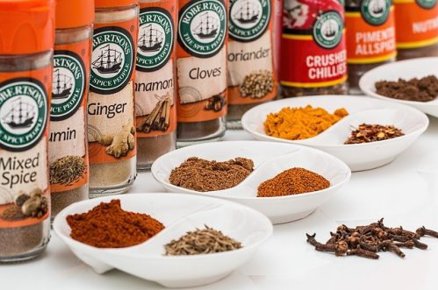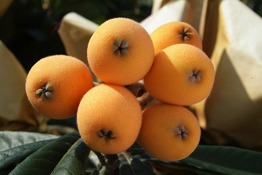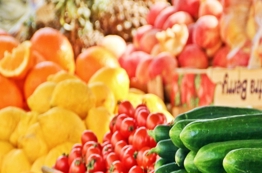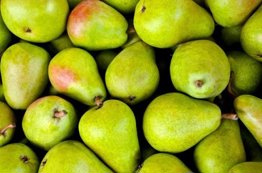Shemitah calendar for herbs and spices

When does each kind of herb and spice have kedushat shevi'it and when is its bi'ur time? Appendix D of the Consumer's Guide to Shemitah.
|
Herb[1] |
Kedushat shevi'it starts |
Kedushat shevi'it ends |
Sefichin prohibition starts |
Sefichin prohibition ends |
Bi'ur time |
|
Anise |
No kedushat shevi'it (k.s.)[2] |
NA |
NA[2] |
NA |
NA[2] |
|
Basil |
3 Tishrei shemitah |
3 Tishrei eighth year |
Early Dec. shemitah |
Late Nov. eighth year |
NA[5] |
|
Bay leaf |
Mid-April shemitah |
Mid-May eighth year |
Not sefichin[2] |
NA |
NA[2] |
|
Bible Hyssop (Lebanese/Syrian oregano, a.k.a. za'atar) |
3 Tishrei shemitah |
Late Dec. eighth year |
Not sefichin[4] |
NA |
NA[5] |
|
Black pepper |
No k.s.[2] |
NA |
NA[2] |
NA |
NA[2] |
|
Caper |
Late May shemitah |
Late May eighth year |
Not sefichin[4] |
NA |
Mid-Nov. eighth year |
|
Caraway |
3 Tishrei shemitah |
Late Jan. eighth year (Early Shevat 5783-2023) |
Late Feb. shemitah |
Mid-Feb. eighth year |
NA |
|
Cardamom (Cardamon) |
No k.s.[2] |
NA |
NA[2] |
NA |
NA[2] |
|
Chives |
3 Tishrei shemitah |
Late Nov. eighth year |
Not sefichin[4] |
NA |
NA[5] |
|
Cinnamon |
No k.s.[2]
|
NA |
NA[2] |
NA |
NA[2] |
|
Clove |
No k.s.[2]
|
NA |
NA[2] |
NA |
NA[2] |
|
Cumin |
No k.s.[2] |
NA |
NA[2] |
NA |
NA[2] |
|
Fenugreek |
No k.s.[2] |
NA |
NA[2] |
NA |
NA[2] |
|
Ginger |
No k.s.[2] |
NA |
NA[2] |
NA |
NA[2] |
|
Hawaij – coffee mix |
No k.s.[2] |
NA |
NA[2] |
NA |
NA[2] |
|
Hawaij – soup (Yemenite soup mix) |
No k.s.[2] |
NA |
NA[2] |
NA |
NA[2] |
|
Hyssop (medicinal plant, Hyssopus officinalis) |
3 Tishrei shemitah |
Late Dec. eighth year |
Not sefichin[4] |
NA |
NA[5] |
|
Lemon balm |
3 Tishrei shemitah |
Late Nov. eighth year |
Not sefichin[4] |
NA |
NA[5] |
|
Lemon grass |
3 Tishrei shemitah |
Late Nov. eighth year |
Not sefichin[4] |
NA |
No bi'ur[5] |
|
Lemon verbena |
3 Tishrei shemitah |
Late Nov. eighth year |
Not sefichin[4] |
NA |
No bi'ur[5] |
|
Mint and peppermint |
3 Tishrei shemitah |
Late Nov. eighth year |
Not sefichin[4] |
NA |
No bi'ur[5] |
|
Mustard |
No k.s.[2] |
NA |
NA[2] |
NA |
NA[2] |
|
Nigella (black cumin, kalonji) |
No k.s.[3] |
NA |
NA[3] |
NA |
NA[3] |
|
Oregano (wild marjoram) |
3 Tishrei shemitah |
Late Dec. eighth year |
Not sefichin[4] |
NA |
NA[5] |
|
Poppy |
No |
NA |
NA |
NA |
NA[2] |
|
Rosemary |
Late Sept. shemitah |
Late May eighth year (Early Sivan 5783-2023) |
Not sefichin[4] |
NA |
NA[5] |
|
Saffron crocus (autumn crocus) |
No k.s.[2] |
NA |
NA[2] |
NA |
NA[2] |
|
Sage |
3 Tishrei shemitah |
Late Nov. eighth year |
Not sefichin[4] |
NA |
NA[5] |
|
Sesame |
No k.s.[2] |
NA |
NA[2] |
NA |
NA[2] |
|
Tarragon |
3 Tishrei shemitah |
Late Jan. eighth year (Early Shevat 5783-2023)
|
Not sefichin[4] |
NA |
NA[5] |
|
Thyme |
3 Tishrei shemitah |
Early Kislev eighth year |
Not sefichin[4] |
NA |
NA[5] |
|
Tree wormwood |
3 Tishrei shemitah |
Early Kislev eighth year |
Not sefichin[4] |
NA |
NA[5] |
|
True watercress |
3 Tishrei shemitah |
Early Kislev eighth year |
Not sefichin[4] |
NA |
NA[5] |
|
Turmeric |
No k.s.[2] |
NA |
NA[2] |
NA |
NA[2] |
|
Wormwood |
3 Tishrei shemitah |
Late Nov. eighth year |
Not sefichin[4] |
NA |
NA[2] |
[1] Herbs assume kedushat shevi'it from the time there is new growth. If the beginning of the plant growth occurred after Rosh Hashanah, the plant has kedushat shevi'it.
[2] Shemitah laws do not apply to imports. However, if one grows such plants in their garden, the plant assumes kedushat shevi'it. Nevertheless, bi'ur does not apply. For annuals, however, if the plant self-seeded and sprouted during the shemitah year, the sefichin prohibition also applies.
[3] Produced by non-Jews—shemitah laws do not apply.
[4] Perennial plant—the sefichin prohibition does not apply.
[5] Grows all year long—the bi'ur obligation does not apply.




